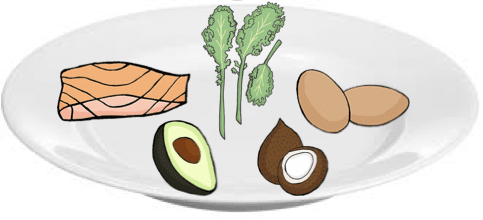
Intermittent Fasting Get Lean & Healthy Without Dieting
You may know by now that my last book, Fast Diets For Dummies, is about fasting. I wrote it because I don't like to feel bloated or fat, I don't like to feel old, I don't like to use the spare drawers in my mind thinking about my weight. I don’t like to get sick. Moreover, sometimes there isn’t a damn thing around to eat, so I’m staring down the barrel of a bag of Sun Chips or nothing (like last Spring when I was flying out of LAX). Instead of telling myself “OMG there is nothing to eat … I’m going to die! I have discovered that going without food once in a while is not going to kill me. In fact, it makes me feel — and look — better!
I was a body builder and a fitness guru in my twenties. While in school, I was “Ms. St. Louis” for a body building show I won. I followed the Arnold Classic every year, and even followed a bodybuilding diet regimen from which my trainers and I did not deviate. This meant every two hours was feeding time, and it was the golden rule of bodybuilding that you never, ever miss a meal. I had the alarm on my sports watch go off every two hours and stuffed that boiled chicken down my throat.
Well, I’ve come a long way, baby! I now know the science and have lived the results of fasting. When I started traveling a lot, I knew I needed to find a system that kept me from going off the rails all the time. For me, that strategy was Intermittent Fasting.
Here’s the deal:
Intermittent Fasting: Get Lean and Healthy Without Dieting
For years, I’ve worked with patients in a constant struggle with food. Often, they feel like they’ve tried everything.
So many diets … so much hype … and SO MUCH frustration.
But what if I told you there’s a solution that’s been around since the days of Hippocrates and that might solve your diet battles once and for all?
It’s a simple approach to eating that’s scientifically proven to help stabilize weight, promote healing and increase longevity.
I’m talking about intermittent fasting — a strategy that’s been used as a cure-all for centuries.
But even though it’s old, there’s growing excitement about it.
What Exactly is Intermittent Fasting?
Intermittent fasting simply means that for one or two days a week, you take a break from eating (in other words, giving yourself a full 24- to 32-hour fast). The rest of the time, you just follow basic eating guidelines that you already know: consuming lots of healthy fats, lean proteins, veggies and some fruit, and being conscious of processed food intake, and so on.
Intermittent fasting isn’t a diet in the traditional sense — it’s a lifestyle change. Many have found it the ideal antidote to yo-yo dieting and compulsive eating habits.
Making Intermittent Fasting Work for You
If you’ve never tried fasting before, jumping into a full 24-hour fast can be difficult. So you might want to start with a shorter period of time, such as 12 hours.
Also, you’ll need to embrace feelings of hunger. When they come, recognize that your mind is telling your stomach it needs food only because that’s what it’s used to. But foregoing food for a short time is actually good for you. Your body may complain in the moment, but ultimately it will thank you.
Of course, any discomfort can tempt you to give up and seek a different approach. So I suggest you make a commitment to yourself to try weekly fasting for one full month before deciding whether it works for you.
Tips for Making Intermittent Fasting Easier
Sometimes, making intermittent fasting work comes down to scheduling. Here are a few suggestions:
- If you plan to fast on a particular day when you also have committed to a social event, simply postpone your fast until the following day.
- You don’t need to go to bed hungry! When you sleep, you naturally fast. So try fasting from dinner to dinner. (For example, if you finish dinner at 7 p.m., you could begin your fast at 7 p.m. and break it at 7 p.m. the following day.)
- You should probably avoid breakfast-to-breakfast fasting. This schedule forces you to go to bed hungry, which is never fun. Further, you may get so hungry by the end of the day that you’re tempted to break your fast early (and to do it impulsively with poor choices, such as sugary treats or fast food).
- Flexibility is the key to success. When you start, you may prefer lunch-to-lunch fasting. But over time you might find that your schedule changes and you need to switch things up. Go with it! This isn’t about building your life around fasting; it’s about building fasting into your life.
What You Should Consume During a Fast
You don’t eat anything while fasting. But it’s critical that you drink at least eight glasses of water. This will help you feel fuller and ensure you stay hydrated.
In addition, you can drink these non-caloric beverages:
- Black coffee
- Black tea
- Green tea
- Herbal teas
- Sparkling water
Although these beverages are okay during a fast, you should keep caffeine consumption to a minimum. I recommend no more than two cups of coffee per day. And no milk, cream, sugar or sugar-free sweeteners!
You may take vitamins and supplements while fasting. But taking them on an empty stomach makes some people feel nauseated. If that happens to you, you might want to take vitamins only on non-fasting days.
What to Eat When You Come Off Your Fast
When you break your fast, you should eat the kind of nutritious foods you would have ideally eaten if you hadn’t fasted. Plan ahead for this. Have healthy, easy-to-eat foods ready for the end of your fast. Do not try to shop while you’re fasting!
Good foods to have ready for post-fast snacking include:
- All-natural jerky (beef, bison, ostrich, and so on)
- Fresh crudités, such as sliced carrots, celery, cucumber and broccoli or cauliflower florets
- Hard-boiled eggs
- Raw unsalted nuts, such as Brazil nuts, cashews, macadamia nuts and walnuts
Knowing When Not to Fast
Intermittent fasting isn’t appropriate for everyone. You shouldn’t try intermittent fasting if you’re:
- Pregnant or trying to become pregnant
- Immunosuppressed
- Diabetic
- Under 18
If you have any health challenges or take prescribed medications, be sure to consult with your physician before giving intermittent fasting a try.
Reaping the Rewards
If you haven’t fasted before, intermittent fasting can feel like a big challenge. It’s not uncommon for people to experience headaches at first as well as a variety of emotions.
But it gets better.
And as many studies have shown, so will your percentage of body fat, energy levels, brain function and ability to ward off illness. Think about it, everything needs a rest now and then, including your digestive system. Intermittent fasting is just the ticket! It triggers a nearly miraculous cleansing process throughout the entire body. It not only permits organs and glands a much-needed rest, particularly the digestive system, but it also allows for the body’s natural home-cleaning mechanisms (including white blood cells, enzymes, and so on) to course through your body and take out the trash. That trash, includes anything from damaged cells, metabolic waste, toxins, pollutants, unwelcome bacteria or microbes. Oh, and by the way? Muscle tissue also enters into a restoration process, as old, damaged tissue is recycled when you enter into a fast.
Try it, you’ve got nothing to lose, but a lot to gain! Let me know how it goes.
Keep thinking big and living bold!
-Dr. Kellyann







